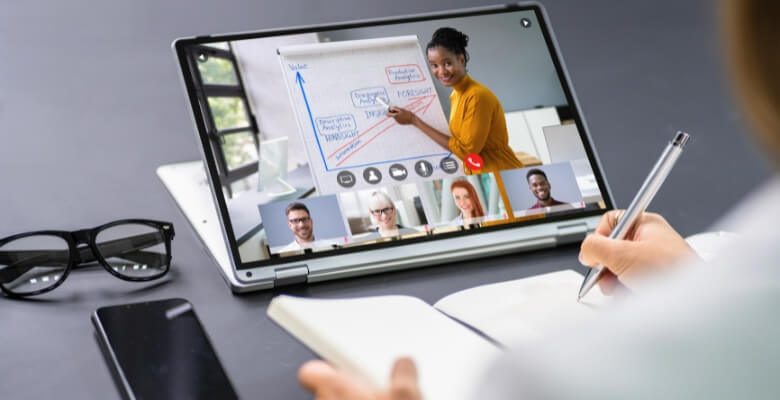Virtual academic conferences are vital platforms that allow researchers to connect globally without travel barriers. They offer unique opportunities to share ideas, collaborate, and stay current in your field. Maximizing these events can significantly enhance your academic journey.
So, if you are wondering “How can I make the most of virtual academic conferences?”
You can start by planning ahead by marking key sessions and preparing questions you’d like to ask. Engage actively in Q&As and networking sessions, introducing your research with a concise pitch. Utilize digital tools for note-taking, and follow up with new contacts on social media. Incorporate the insights you gain into your work.
Let’s look at these strategies to help you fully benefit from virtual conferences.
What Makes Virtual Conference Differ from Regular One?
Virtual conferences differ from regular ones in several important ways, offering unique benefits and challenges. Participants attend from anywhere, reducing the time and costs of traveling to a conference venue. Networking opportunities look different as digital platforms enable connections without face-to-face interactions. However, attendees must adapt quickly to tools, features, and schedules for upcoming academic conferences, making preparation essential.

Another key difference involves the structure of sessions, which are often more flexible in virtual formats. Many online events offer recorded sessions, allowing participants to review them at convenient times. Engagement during a virtual conference requires more effort, with digital Q&As replacing in-person discussions. Despite these changes, virtual conferences can create new learning opportunities for attendees willing to adapt and engage fully.
Qualities of a Good Virtual Academic Conference
A good virtual academic conference keeps participants engaged, informed, and connected despite physical distances. Successful events prioritize interactive features and provide smooth access to sessions and networking opportunities. Here’s what to look for in a virtual academic conference experience:
- An intuitive platform interface helps participants interact with ease, minimizing technical issues and maximizing time for learning.
- Interactive Q&A sessions encourage active involvement, allowing participants to ask questions and exchange valuable insights with presenters.
- Clear scheduling information helps participants prepare by knowing what sessions are happening and when they need to join.
- Real-time networking opportunities, like breakout rooms, make connecting with peers and experts easy and meaningful.
- Session recordings are made available, giving attendees the flexibility to revisit valuable talks at a convenient time.
- Organized post-event communication keeps the learning going, helping participants stay in touch and share ongoing insights.
- Accessible tech support stands by during the event, offering prompt help to address any technical difficulties participants may face.
Good virtual conferences create an environment where learning, interaction, and connection feel natural and effortless. The right qualities make these events not just productive but genuinely enjoyable for all involved.
How Can I Make the Most of Virtual Academic Conferences?
Without ever having to leave your desk, virtual academic conferences offer incredible opportunities for expanding your knowledge, forming connections, and showcasing your research. Making the most of these digital events involves planning, engaging, and following up to maximize every opportunity. Here’s a step-by-step guide to help you get the most out of your virtual conference experience:
Step 1: Pre-conference Planning
Start by familiarizing yourself with the conference agenda, noting keynotes, sessions, and must-attend events. Prepare questions for specific sessions in advance to stay engaged and informed. This prep work helps you feel confident and focused during the conference. Marking priorities in advance will allow you to use your time more effectively.
Step 2: Networking with Confidence
Engage actively in virtual meet-ups and breakout rooms, as these are ideal for meaningful networking. Prepare a clear, concise elevator pitch about your research to introduce yourself with impact. Don’t shy away from connecting with peers and experts through LinkedIn or other professional platforms, as these are some of the best ways to network at virtual academic conferences. Networking can lead to collaborations or mentorships, so approach it with curiosity.
Step 3: Active Engagement in Sessions
Take full advantage of interactive Q&As, polls, and chat discussions during sessions to deepen your learning. This is an opportunity to share your ideas and make memorable connections with speakers and participants. Engaging actively can also clarify concepts and help you gain fresh insights into your field. Remember, active participation often leaves a lasting impression.
Step 4: Utilize Digital Tools Effectively
Utilize note-taking apps and screen-capture tools to record important points and reference them later. Many conference apps offer features for updates, polls, and interaction, making them invaluable for staying informed. Efficient digital tools help you manage information without feeling overwhelmed by details. Staying organized digitally also simplifies the follow-up process.
Step 5: Post-conference Follow-up
After the conference, reach out to new connections to keep the dialogue open and share insights. Posting highlights or takeaways on social media can help you reinforce your learning while sharing knowledge with others. Following up with peers or experts also keeps the relationships alive and meaningful. Finally, apply new insights to your research to maximize the value of your experience.
How to Prepare Yourself for a Virtual Academic Conference?
Preparing for a virtual academic conference is key to making the experience smooth, enjoyable, and productive. Simple steps, like familiarizing yourself with the event platform and planning your schedule, can make a big difference. Here are some practical tips to help you get ready for your next virtual conference:
- Review the conference agenda thoroughly to spot must-attend sessions and topics. This way, you can prioritize your time effectively and avoid schedule conflicts.
- Test your technology beforehand to avoid last-minute technical issues. Check your internet, camera, and microphone to ensure everything works perfectly on the day.
- Set clear goals for the conference, outlining what you hope to learn and achieve. Defining goals will keep you focused and engaged during sessions.
- Prepare a concise elevator pitch to introduce yourself to peers and presenters. A quick, clear intro helps make a memorable impression in networking opportunities.
- Organize a quiet, comfortable space where you can fully concentrate without distractions. A dedicated workspace helps you stay engaged and absorb information.
- Gather any materials or documents you might need for reference during the sessions. Having these handy makes it easier to follow along and participate actively.
What is the Best Way to Create a Conducive Environment?
Creating a conducive environment for a virtual academic conference can make a big difference in how much you gain from the experience. Setting up a space that keeps you focused, comfortable, and engaged helps you connect with the content and the people. Here are some ways to make your conference setting work for you.
Designate a Dedicated Workspace
Choose a quiet, distraction-free area where you can concentrate on the sessions without interruptions. Make this area as comfortable as possible, ensuring your seating and desk height promote focus. Adding essentials like a water bottle and notepad keeps you prepared for sessions. This setup is one of the foundational steps to get ready for a virtual conference.
Optimize Your Lighting and Sound
Good lighting improves visibility, helping you stay more alert and present during sessions. Natural light is ideal but soft, diffused artificial light works well, too. Use quality headphones for clear audio, minimizing background noise and distractions. A well-lit, quiet space boosts your overall conference experience.
Arrange Necessary Tech Tools
Having the right tech setup can reduce technical frustrations and keep you engaged. Test your camera, microphone, and internet connection before the conference begins to ensure a smooth experience. Keeping chargers and adapters within reach helps you avoid interruptions. These tech preparations let you fully focus on learning and interacting.
Personalize Your Space for Comfort
Small personal touches, like a favorite pen or a comfortable chair cushion, can enhance your focus and mood. Plants, cozy lighting, or a framed photo create a relaxed yet professional feel. Adjusting your space for comfort helps you stay energized throughout long conference days. Personalizing your environment makes the experience more enjoyable and engaging.
FAQs for How Can I Make the Most of Virtual Academic Conferences?
Maximizing your experience at virtual academic conferences requires strategic planning and engagement. Here are ten frequently asked questions (FAQs) to help you make the most of these online events. These insights will not only enhance your participation but also ensure you leave with valuable knowledge and connections.
What Tools Do I Need to Learn Before the Conference?
Familiarize yourself with the conference platform and its features, including video conferencing, chat functions, and virtual networking tools. Understanding these tools ensures smooth participation and effective engagement. Practice using these tools beforehand if possible.
How Can I Effectively Plan My Schedule?
Review the conference agenda and prioritize the sessions you want to attend. Schedule time for both live and on-demand sessions to maximize content availability. A well-structured schedule keeps you organized and efficient throughout the conference.
What Are the Benefits of Setting Up Appointments and Networking?
Schedule one-on-one meetings with presenters or other attendees to discuss specific topics. Networking helps build professional relationships and can lead to future collaborations. These interactions are valuable for exchanging ideas and gaining insights.
Why Is It Important to Balance Live and On-Demand Sessions?
Balancing live and on-demand sessions allows you to participate in real-time interactions and catch up on content at your own pace. This flexibility ensures you don’t miss valuable sessions and can manage your time effectively.
How Can I Follow up After the Conference?
Review your notes and reach out to new contacts via email or LinkedIn. Share your experiences on social media and discuss how the insights gained will impact your work. Following up helps reinforce connections and solidify what you’ve learned.
Bottom Line
Virtual academic conferences present incredible opportunities for learning, networking, and professional growth in an accessible format. With thoughtful preparation, active engagement, and a conducive setup, you can maximize every aspect of the event.
To address the question, “How can I make the most of virtual academic conferences?” start by setting clear goals, managing your environment, and utilizing digital tools to stay organized.
By connecting with peers, sharing insights, and following up post-conference, you’ll cultivate valuable relationships and knowledge that support your academic journey. Embrace these strategies to make each virtual conference experience impactful and rewarding.







